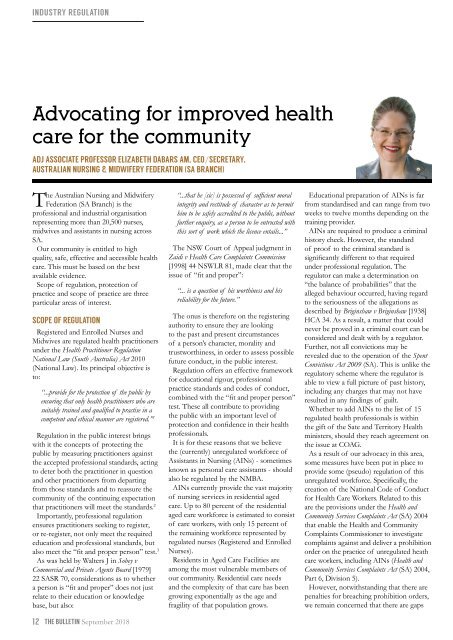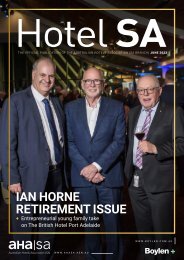LSB September 2018_Web
Create successful ePaper yourself
Turn your PDF publications into a flip-book with our unique Google optimized e-Paper software.
INDUSTRY REGULATION<br />
Advocating for improved health<br />
care for the community<br />
ADJ ASSOCIATE PROFESSOR ELIZABETH DABARS AM, CEO/SECRETARY,<br />
AUSTRALIAN NURSING & MIDWIFERY FEDERATION (SA BRANCH)<br />
The Australian Nursing and Midwifery<br />
Federation (SA Branch) is the<br />
professional and industrial organisation<br />
representing more than 20,500 nurses,<br />
midwives and assistants in nursing across<br />
SA.<br />
Our community is entitled to high<br />
quality, safe, effective and accessible health<br />
care. This must be based on the best<br />
available evidence.<br />
Scope of regulation, protection of<br />
practice and scope of practice are three<br />
particular areas of interest.<br />
SCOPE OF REGULATION<br />
Registered and Enrolled Nurses and<br />
Midwives are regulated health practitioners<br />
under the Health Practitioner Regulation<br />
National Law (South Australia) Act 2010<br />
(National Law). Its principal objective is<br />
to:<br />
“...provide for the protection of the public by<br />
ensuring that only health practitioners who are<br />
suitably trained and qualified to practise in a<br />
competent and ethical manner are registered.” 1<br />
Regulation in the public interest brings<br />
with it the concepts of protecting the<br />
public by measuring practitioners against<br />
the accepted professional standards, acting<br />
to deter both the practitioner in question<br />
and other practitioners from departing<br />
from those standards and to reassure the<br />
community of the continuing expectation<br />
that practitioners will meet the standards. 2<br />
Importantly, professional regulation<br />
ensures practitioners seeking to register,<br />
or re-register, not only meet the required<br />
education and professional standards, but<br />
also meet the “fit and proper person” test. 3<br />
As was held by Walters J in Sobey v<br />
Commercial and Private Agents Board [1979]<br />
22 SASR 70, considerations as to whether<br />
a person is “fit and proper” does not just<br />
relate to their education or knowledge<br />
base, but also:<br />
“...that he [sic] is possessed of sufficient moral<br />
integrity and rectitude of character as to permit<br />
him to be safely accredited to the public, without<br />
further enquiry, as a person to be entrusted with<br />
this sort of work which the licence entails...”<br />
The NSW Court of Appeal judgment in<br />
Zaidi v Health Care Complaints Commission<br />
[1998] 44 NSWLR 81, made clear that the<br />
issue of “fit and proper”:<br />
“... is a question of his worthiness and his<br />
reliability for the future.”<br />
The onus is therefore on the registering<br />
authority to ensure they are looking<br />
to the past and present circumstances<br />
of a person’s character, morality and<br />
trustworthiness, in order to assess possible<br />
future conduct, in the public interest.<br />
Regulation offers an effective framework<br />
for educational rigour, professional<br />
practice standards and codes of conduct,<br />
combined with the “fit and proper person”<br />
test. These all contribute to providing<br />
the public with an important level of<br />
protection and confidence in their health<br />
professionals.<br />
It is for these reasons that we believe<br />
the (currently) unregulated workforce of<br />
Assistants in Nursing (AINs) - sometimes<br />
known as personal care assistants - should<br />
also be regulated by the NMBA.<br />
AINs currently provide the vast majority<br />
of nursing services in residential aged<br />
care. Up to 80 percent of the residential<br />
aged care workforce is estimated to consist<br />
of care workers, with only 15 percent of<br />
the remaining workforce represented by<br />
regulated nurses (Registered and Enrolled<br />
Nurses).<br />
Residents in Aged Care Facilities are<br />
among the most vulnerable members of<br />
our community. Residential care needs<br />
and the complexity of that care has been<br />
growing exponentially as the age and<br />
fragility of that population grows.<br />
Educational preparation of AINs is far<br />
from standardised and can range from two<br />
weeks to twelve months depending on the<br />
training provider.<br />
AINs are required to produce a criminal<br />
history check. However, the standard<br />
of proof to the criminal standard is<br />
significantly different to that required<br />
under professional regulation. The<br />
regulator can make a determination on<br />
“the balance of probabilities” that the<br />
alleged behaviour occurred, having regard<br />
to the seriousness of the allegations as<br />
described by Briginshaw v Briginshaw [1938]<br />
HCA 34. As a result, a matter that could<br />
never be proved in a criminal court can be<br />
considered and dealt with by a regulator.<br />
Further, not all convictions may be<br />
revealed due to the operation of the Spent<br />
Convictions Act 2009 (SA). This is unlike the<br />
regulatory scheme where the regulator is<br />
able to view a full picture of past history,<br />
including any charges that may not have<br />
resulted in any findings of guilt.<br />
Whether to add AINs to the list of 15<br />
regulated health professionals is within<br />
the gift of the Sate and Territory Health<br />
ministers, should they reach agreement on<br />
the issue at COAG.<br />
As a result of our advocacy in this area,<br />
some measures have been put in place to<br />
provide some (pseudo) regulation of this<br />
unregulated workforce. Specifically, the<br />
creation of the National Code of Conduct<br />
for Health Care Workers. Related to this<br />
are the provisions under the Health and<br />
Community Services Complaints Act (SA) 2004<br />
that enable the Health and Community<br />
Complaints Commissioner to investigate<br />
complaints against and deliver a prohibition<br />
order on the practice of unregulated heath<br />
care workers, including AINs (Health and<br />
Community Services Complaints Act (SA) 2004,<br />
Part 6, Division 5).<br />
However, notwithstanding that there are<br />
penalties for breaching prohibition orders,<br />
we remain concerned that there are gaps<br />
12<br />
THE BULLETIN <strong>September</strong> <strong>2018</strong>


















